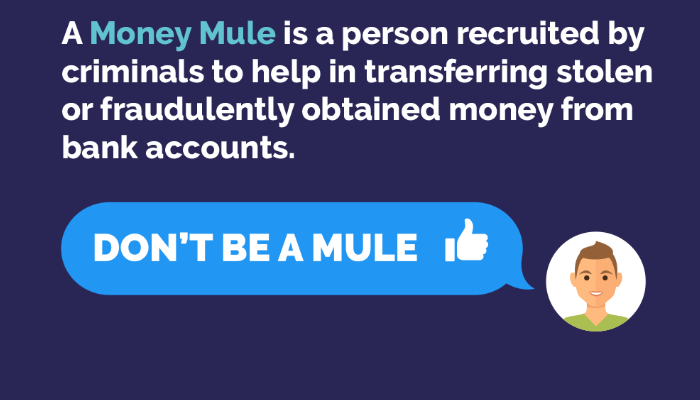Protecting your money from scams
March 21, 2024
For Global Money Week (GMW), we’re bringing you a news story every day on all things money. Today, we’re looking at protecting your money from scammers.
None of us ever think we will be a victim of Fraud. However, it is more common than you think with the latest figures from the BPFI indicating that victims were conned out of a total of €8.6m euro during the first half of 2023.
Let’s have a look at the most common scams that are targeting young people.
Money Mules

What may seem like an easy way to make money, often has serious consequences. Criminals typically target young people through tactics such as a fake job advert. Common job titles include “Financial Manager” or “Payments Clerk”, with no experience needed other than having a bank account. Other common ways of targeting young people are through social media posts, messages or even in person. These criminals will offer you money or an expensive gift to “mind” a certain amount of money in your personal bank account. This is Money Laundering.
If you are caught acting as a money mule, even if you didn’t realise you were being used as a mule, you can face a prison sentence, a fine, community service and being banned from opening a bank account in the future.
Top Tips
• Never give your bank details to anyone you don’t know or trust
• Never mind money for anyone even if you already know them
• If you think you are involved in Money Muling, contact your bank and the Gardaí immediately
Ticket Scams
Another popular scam that typically targets young people is ticket scams. It is important to be aware of the signs that someone is trying to scam you with a fake ticket to a concert, festival, or event.
Fraudsters often take advantage of sold-out concerts or sporting events. They will take your money and either never send you a ticket or send you a ticket that is fake and won’t gain you entry to the event.
Top Tip
Only buy tickets from the venue’s box office, the promoter, an official agent, or a well-known and reputable ticket exchange site.
Other Scams
Other popular scams include:
- Email Fraud,
- Phone Fraud
- Online Fraud and many more
Check out FraudSmart, Central Bank and The CCPC websites to stay aware of what fraud and scams are affecting people in Ireland
How to avoid being scammed
Think SAFE
S: Stop and think. Who is this person contacting you? Can you trust them? Are they making you feel rushed to provide them with your personal details and banking information.
A: Assess the information they are providing you to make sure they are legitimate. Are there any typos in the webpage or in their messages? Has their social media account just been created?
F: Fact Check to make sure this is a legitimate offer or source. Seek advice to ensure the service or product is genuine. Ask yourself; does this offer seem too good to be true? If yes, then it normally is.
E: Expose and Report to the Gardaí. If you are a victim of fraud, contact your bank to ensure no more money can be taken from you. Report the incident to your local Garda station as a criminal matter.


